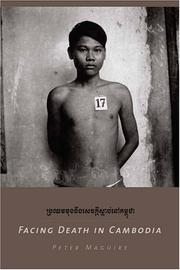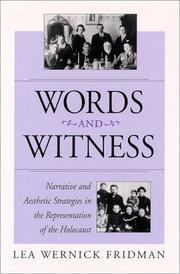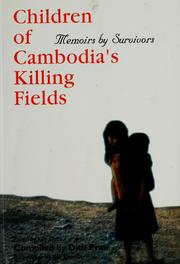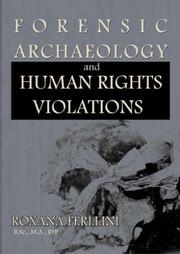| Listing 1 - 10 of 66 | << page >> |
Sort by
|

ISBN: 0231120524 0231509391 9780231120524 9780231509398 Year: 2005 Publisher: Columbia University Press
Abstract | Keywords | Export | Availability | Bookmark
 Loading...
Loading...Choose an application
- Reference Manager
- EndNote
- RefWorks (Direct export to RefWorks)
The Khmer Rouge regime took control of Cambodia by force of arms, then committed the most brazen crimes since the Third Reich: at least 1.5 million people murdered between 1975 and 1979. Yet no individuals were ever tried or punished. This book is the story of Peter Maguire's effort to learn how Cambodia's "culture of impunity" developed, why it persists, and the failures of the "international community" to confront the Cambodian genocide. Written from a personal and historical perspective, Facing Death in Cambodia recounts Maguire's growing anguish over the gap between theories of universal justice and political realities. Maguire documents the atrocities and the aftermath through personal interviews with victims and perpetrators, discussions with international and NGO officials, journalistic accounts, and government sources gathered during a ten-year odyssey in search of answers. The book includes a selection of haunting pictures from among the thousands taken at the now infamous Tuol Sleng prison (also referred to as S-21), through which at least 14,000 men, women, and children passed-and from which fewer than a dozen emerged alive. What he discovered raises troubling questions: Was the Cambodian genocide a preview of the genocidal civil wars that would follow in the wake of the Cold War? Is international justice an attainable idea or a fiction superimposed over an unbearably dark reality? Did issues of political expediency allow Cambodian leaders to escape prosecution? The Khmer Rouge violated the Nuremberg Principles, the United Nations Charter, the laws of war, and the UN Genocide Convention. Yet in the decade after the regime's collapse, the perpetrators were rescued and rehabilitated-even rewarded-by China, Thailand, the United States, and the UN. According to Peter Maguire, Cambodia holds the key to understanding why recent UN interventions throughout the world have failed to prevent atrocities and to enforce treaties.
Political atrocities --- Trials (Genocide) --- Cambodia --- History --- Genocide --- War crime trials --- Political atrocities - Cambodia --- Trials (Genocide) - Cambodia --- Cambodia - History - 1975-1979

ISBN: 0791492443 9780791492444 9780791446102 0791446107 0791446093 0791446107 9780791446096 Year: 2000 Publisher: Albany State University of New York Press
Abstract | Keywords | Export | Availability | Bookmark
 Loading...
Loading...Choose an application
- Reference Manager
- EndNote
- RefWorks (Direct export to RefWorks)
Connects Holocaust literature and film to other works of "historical horror" in order to examine the limits that trauma imposes upon literary and artistic expression.
Holocaust, Jewish (1939-1945), in literature. --- Jews --- Persecutions. --- Antisemitism --- Persecution --- Political atrocities
Book
ISBN: 0253008905 9780253008909 1299620116 9781299620117 9780253008787 0253008786 Year: 2013 Publisher: Bloomington, Indiana
Abstract | Keywords | Export | Availability | Bookmark
 Loading...
Loading...Choose an application
- Reference Manager
- EndNote
- RefWorks (Direct export to RefWorks)
Dating back millennia, antisemitism has been called ""the longest hatred."" Thought to be vanquished after the horrors of the Holocaust, in recent decades it has once again become a disturbing presence in many parts of the world. Resurgent Antisemitism presents original research that elucidates the social, intellectual, and ideological roots of the ""new"" antisemitism and the place it has come to occupy in the public sphere. By exploring the sources, goals, and consequences of today's antisemitism and its relationship to the past, the book contributes to an understanding of this phenomenon
Antisemitism --- Anti-Jewish attitudes --- Anti-Semitism --- Ethnic relations --- Prejudices --- Philosemitism --- History --- Jews --- Persecutions. --- Persecution --- Political atrocities
Book
ISBN: 0522877613 9780522877618 0522877605 9780522877601 Year: 2021 Publisher: Carlton, Victoria
Abstract | Keywords | Export | Availability | Bookmark
 Loading...
Loading...Choose an application
- Reference Manager
- EndNote
- RefWorks (Direct export to RefWorks)
"The Indonesian invasion of East Timor in 1975 led to a prolonged conflict, severe human rights abuses and a large loss of life. From 1975 to 1983 the Indonesian military's campaign of 'encirclement and annihilation' destroyed rural food resources, creating the famine that took most of the lives lost during the occupation. The Australian governments of Gough Whitlam and Malcolm Fraser presented themselves as advocates for human rights and the international rule of law, while viewing relations with Indonesia as key to their foreign policy objectives. These positions came into conflict due to the Indonesian invasion of East Timor Based upon an extensive study of Australian foreign affairs archives, as well as interviews, A Narrative of Denial demonstrates how the Australian government responded to the conflict by propagating a version of events that denied the reality of the catastrophe occurring in East Timor."--Publisher's description.
Autonomy and independence movements. --- Political atrocities. --- Australia --- Indonesia --- Timor-Leste --- Foreign relations

ISBN: 9786611722937 1281722936 0300133839 0585347603 9780585347608 9780300133837 0300068395 0300078730 9780300068399 6611722939 9781281722935 Year: 1997 Publisher: New Haven, Conn. Yale University Press
Abstract | Keywords | Export | Availability | Bookmark
 Loading...
Loading...Choose an application
- Reference Manager
- EndNote
- RefWorks (Direct export to RefWorks)
This extraordinary book contains eyewitness accounts of life in Cambodia during Pol Pot's genocidal Khmer Rouge regime from 1975 to 1979, accounts written by survivors who were children at the time. The book has been put together by Dith Pran, whose own experiences in Cambodia were so graphically portrayed in the film The Killing Fields.The testimonies related here bear poignant witness to the slaughter the Khmer Rouge inflicted on the Cambodian people. The contributors-most of them now in the United States and pictured in photographs that accompany their stories-report on life in Democratic Kampuchea as seen through children's eyes. They speak of their bewilderment and pain as Khmer Rouge cadres tore their families apart, subjected them to harsh brainwashing, drove them from their homes to work in forced-labor camps, and executed captives in front of them. Their stories tell of suffering and the loss of innocence, the struggle to survive against all odds, and the ultimate triumph of the human spirit.
Political atrocities --- Children --- Childhood --- Kids (Children) --- Pedology (Child study) --- Youngsters --- Age groups --- Families --- Life cycle, Human --- Cambodia --- History --- S32/0200 --- Central Asia--Central Asia: general works --- Political atrocities -- Cambodia.. --- Children -- Cambodia -- Biography.. --- Cambodia -- History -- 1975-1979.

ISBN: 9401201846 1423787579 9781423787570 9042017481 9789042017481 9789401201841 Year: 2006 Publisher: Amsterdam New York Rodopi
Abstract | Keywords | Export | Availability | Bookmark
 Loading...
Loading...Choose an application
- Reference Manager
- EndNote
- RefWorks (Direct export to RefWorks)
The topic of "evil" means different things depending upon context. For some, it is an archaic term, while others view it as a central problem of ethics, psychology, or politics. Coupled with state power, the problem of evil takes on a special salience for most observers. When governments do evil -in whatever way we define the term - the scale of harm increases, sometimes exponentially. The evils of state violence, then, demand our attention and concern. Yet the linkage of evil with state power does not resolve the underlying question of how to understand the concepts that we invoke when we use the term. Instead, the question becomes what evil means in the context of and in relation to state power. The fifteen essays in this book bring multiple perspectives to bear on the problems of state-sponsored evil and violence, and on the ways in which law enables or responds to them. The approaches and conclusions articulated by the various contributors sometimes complement and sometimes stand in tension with each other, but as a whole they contribute to our ongoing effort to understand the characteristics and workings of state power, and our need to grapple with the harm it causes.
Political atrocities --- Political violence --- State-sponsored terrorism --- Government violence --- Governmental violence --- State-sponsored violence --- State terrorism --- Violence, Governmental --- Violence, State-sponsored --- Terrorism --- Violence --- Political crimes and offenses --- Atrocities --- Government policy --- State-sponsored terrorism. --- Political atrocities. --- Government policy.
Book
ISBN: 9798887191706 9798887191713 Year: 2023 Publisher: Boston, MA
Abstract | Keywords | Export | Availability | Bookmark
 Loading...
Loading...Choose an application
- Reference Manager
- EndNote
- RefWorks (Direct export to RefWorks)
"'A Mind Purified by Suffering': Evgenia Ginzburg's 'Whirlwind' Memoirs is the first book on Ginzburg's Journey into the Whirlwind and Within the Whirlwind, covering such topics as: memory, trauma, motherhood, love, survival strategies, and metafictional structures. It also provides a history of prison camp writings, her biography, and an interview with her son Vasily Aksenov"--
Atrocités politiques --- Autobiographical memory --- Autobiographical memory. --- Camps d'internement --- Internment camps --- Internment camps. --- Mémoire épisodique --- Political atrocities --- Political atrocities. --- Political prisoners' writings, Russian. --- Prisonnières politiques --- Women political prisoners --- Biographies --- Biography --- Ginzburg, Evgenii͡a. --- Krutoĭ marshrut (Ginzburg, Evgenii͡a). --- Soviet Union.
Book
ISBN: 9004411240 9789004411241 9789004411234 Year: 2020 Publisher: Leiden Boston
Abstract | Keywords | Export | Availability | Bookmark
 Loading...
Loading...Choose an application
- Reference Manager
- EndNote
- RefWorks (Direct export to RefWorks)
In The Roles and Functions of Atrocity-Related United Nations Commissions of Inquiry in the International Legal Order, Catherine Harwood explores the turn to international law in atrocity-related United Nations commissions of inquiry and their navigation of considerations of principle (the legal) and pragmatism (the political), to discern their identity in the international legal order. The book traces the inquiry process from establishment and interpretation of the mandate to legal analysis, production of findings and recommendations. The research finds that the turn to international law fundamentally shapes the roles and functions of UN atrocity inquiries. Inquiries continuously navigate between realms of law and politics, with the equilibrium shifting in different moments and contexts.

ISBN: 0398085196 9780398085193 9780398077341 0398077347 9780398077358 0398077355 Year: 2007 Publisher: Springfield Charles C Thomas Publisher, LTD
Abstract | Keywords | Export | Availability | Bookmark
 Loading...
Loading...Choose an application
- Reference Manager
- EndNote
- RefWorks (Direct export to RefWorks)
Forensic archaeology has become a paramount tool with regard to the investigation of human rights abuses in recent times, by utilizing field techniques that provide a scientific means of searching, locating and recovering the victims of human rights abuses. By applying such techniques, human remains may be positively identified, thereby assisting survivors who are then able to lay their dead to rest and begin a process of closure after such tragic events have occurred. Additionally, the circumstances of the victim's demise will be accurately recorded, and in course this information will be dul
Forensic anthropology. --- Forensic sciences. --- Human remains (Archaeology) --- Human rights. --- Crimes against humanity. --- Political atrocities. --- Crime scenes. --- Criminal investigation. --- Medical jurisprudence.
Book
ISBN: 033364493X Year: 1996 Publisher: Basingstoke Macmillan
Abstract | Keywords | Export | Availability | Bookmark
 Loading...
Loading...Choose an application
- Reference Manager
- EndNote
- RefWorks (Direct export to RefWorks)
History of Latin America --- Cuba --- Political atrocities --- Spaniards --- History --- United States --- Etats-Unis --- Social aspects --- Relations --- Histoire --- Apect social --- Social aspects.
| Listing 1 - 10 of 66 | << page >> |
Sort by
|

 Search
Search Feedback
Feedback About UniCat
About UniCat  Help
Help News
News